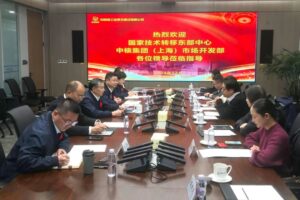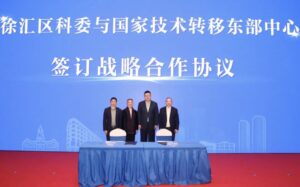
Prof. Wang Xiaoxu discussed with the students about the matching between the supply and demand sides in the process of technology transfer, shared the process and key points of selecting partners and determining the income from cooperation in the process of technology transfer, and guided the students to discuss the distribution of benefits after the university technology inventors left the university.

On the second day of the course, General Manager Kang Kaining started from the difficulties in the technology transfer process of universities, and focused on how to improve the technical maturity of university technological achievements through pilot R&D institutions, as well as the source of pilot funding and the PPP model of pilot funding, which stimulated the participants to think about the national assetization of job technological achievements.

Professor Sun Libing discussed the cooperation mode between industry, university and research institute with the trainees based on his own working experience, and shared the skills of patent operation mode such as high-value patent cultivation, licensing, transfer, investment and financing, and inspired the trainees how to choose the appropriate technology transfer mode and technology transferee to maximize the economic benefits.

On the third day of the course, Tang Xiaolin, founder and CEO of CREG, as the representative of technology transfer agencies, shared with the students the operational strategies of technology transfer projects from different perspectives of both the supply and demand sides, and discussed practical issues such as project screening, market research and partner search.

Zhong Shishi, Director of the Technology Transfer Center of Fudan University, explained the operation points of signing technology transfer contracts, and discussed the responsibilities, rights and benefits of technology transfer contracts, the key to contract negotiation, patent application and protection with the students, inspiring them to sign high-quality technology transfer contracts.

In the speech of the closing ceremony on the 27th, Deputy Director Liang Bing said that the "Technology Transfer Case Workshop" has built a long-term communication platform for the trainees, through which they can share information and resources to solve the confusing problems in the technology transfer work. The "spring" of national technology transfer talents has come, but technology transfer is "easy to enter, but difficult to get started", so we expect the trainees to deepen their learning and improve their practical level, so that they can become leaders in the industry and bring more value to the technology transfer industry and themselves. .

In his speech, Director Zhong Shishi said that technology transfer work requires a professional team of technology transfer talents, and that the training of technology transfer talents should not only focus on theoretical support, but also on practical experience. The learning mode of "Case Workshop" helps students to grasp the key points and difficulties of the whole technology transfer chain and improve their business ability of technology transfer.
In her speech, President Liao Yuqing said that the Shanghai Institute of Technology Transfer has developed both academic education and non-academic education, and has formed a "training + practical training + combat" talent training model. The "Technology Transfer Case Workshop" is a key course launched by the institute in response to the market demand and to improve the practical ability of students in technology transfer. The college will sort out the contents of the cases and set up practical courses based on the cases to cultivate the students' professional abilities through practical work.
During the closing ceremony, Zhang Tian, Director of Science and Technology Department of China Pharmaceutical University, Cai Zhikuan, Deputy Director of Industry-Academia-Research Cooperation Department of Nanjing University of Posts and Telecommunications, and Yang Xiaorong, Partner of Shanghai Ruishi Financial Investment Management Co. The first is that the teaching experts have opened a brand new window for themselves, and during the course, they not only acquired new skills, but also clarified the direction of their efforts. The service of the Transfer Academy is like a cup of milk tea in autumn, which makes the students feel warm; the third "one" is to get to know students from various industries through the case study class, and they are like a starry sky, which will be the backbone of the field in the future.

Afterwards, Yang Xiaorong shared that as an investor, she was used to the original environment and mode, but this course brought her into the brand new industry of technology transfer. At the same time, the case study class also allowed her to get to know many excellent industry experts and practitioners, and to learn a lot of important knowledge that is inspirational and instructive for her work, which is a learning mode she will continue to pursue in the future and a course she is willing to recommend and share with others.

Cai Zhikang said in his speech that as a "newcomer" of university science and technology management, the learning of this case study class is very meaningful. During the course, he not only efficiently absorbed a large number of cases and technology-related knowledge, but also had a clearer idea on technology transfer management and summed up more innovative methods for his next work. At the end of the course, he was very willing to suggest to his unit and called on his colleagues to participate in the class as well.

From now on, Shanghai Institute of Technology Transfer will take the first "Technology Transfer Case Workshop" as the starting point, and make efforts from both academic and non-academic education to continuously build high-quality courses for cultivating technology transfer talents, improve the talent cultivation system, and contribute to the cultivation of technology transfer talents. professionals to explore.





